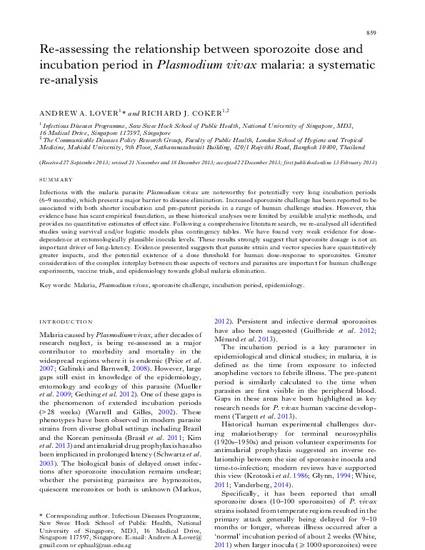
Article
Re-assessing the relationship between sporozoite dose and incubation period in Plasmodium vivax malaria: a systematic re-analysis
Parasitology
(2014)
Abstract
Infections with the malaria parasite Plasmodium vivax are noteworthy for potentially very long incubation periods (6–9 months), which present a major barrier to disease elimination. Increased sporozoite challenge has been reported to be associated with both shorter incubation and pre-patent periods in a range of human challenge studies. However, this evidence base has scant empirical foundation, as these historical analyses were limited by available analytic methods, and provides no quantitative estimates of effect size. Following a comprehensive literature search, we re-analysed all identified studies using survival and/or logistic models plus contingency tables. We have found very weak evidence for dose- dependence at entomologically plausible inocula levels. These results strongly suggest that sporozoite dosage is not an important driver of long-latency. Evidence presented suggests that parasite strain and vector species have quantitatively greater impacts, and the potential existence of a dose threshold for human dose-response to sporozoites. Greater consideration of the complex interplay between these aspects of vectors and parasites are important for human challenge experiments, vaccine trials, and epidemiology towards global malaria elimination.
Keywords
- Plasmodium vivax,
- sporozoite challenge,
- incubation period,
- epidemiology.,
- malaria
Disciplines
Publication Date
Spring 2014
Citation Information
Andrew A. Lover and Richard Coker. "Re-assessing the relationship between sporozoite dose and incubation period in Plasmodium vivax malaria: a systematic re-analysis" Parasitology Vol. 141 (2014) p. 859 - 868 Available at: http://works.bepress.com/andrew-lover/21/
